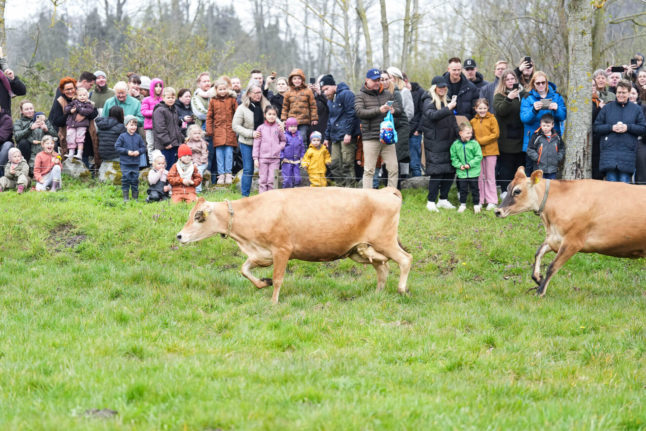Nightclubs and discos to reopen — some for first time since March 2020
Wednesday will be a huge day for Denmark’s clubbers, with many nightclubs and discos opening their doors for the first time since they were closed down in March, 2020, ending one of the last restrictions still in place in Denmark.
The Copenhagen super-club Culture Box is celebrating with a four-day “reopening weekend” which will run from Wednesday evening until battered revellers emerge blinking into the sunlight at 8am on Sunday morning (the nighclub will, however, close at 8am every morning).
The Sigurdsgade nightclub in Nørrebro is waiting until Friday night for its own Åbnings Fest party.
Bakken in the city’s Kødbyen meatpacking district will be open from Wednesday night into the small hours of Sunday morning.
In Aarhus, the Kupé nightclub opens on Wednesday night.
“After 19 months of party prison we are finally set free. Free to party, meet new people, have fun, dance, kiss and create a lot of lovely memories!” the club wrote on its Facebook page.
In Odense, the Slagteriet nightclub will open on Saturday for what the club calls “a true Slagteriet classic”.
Until September 10th, when Denmark will no longer classify Covid-19 as “dangerous to society”, anyone visiting a nightclub will need to show a valid coronapas (or a negative test result, proof of vaccination or proof of immunity due to prior infection).
As Denmark dropped its 1m distance recommendations for public places in mid-August, there will be no additional restrictions on how many people can go on the dance floor or how close people can sit at tables.
End to 2am closing times for bars and restaurants
From September 1st, the ban on bars and restaurants staying open later than 2am will be removed, as will the ban on shops selling alcohol after 2am.
Coronapas dropped for bars and restaurants
From September 1st, it will no longer be required to show a valid coronapas (or a negative test result, proof of vaccination or proof of immunity due to prior infection), to sit indoors in restaurants and bars.
Coronapas dropped for gyms and fitness centres
From September 1st, it will no longer be required to have a valid coronapas (or a negative test result, proof of vaccination or proof of immunity due to prior infection), to attend a gym or fitness centre in Denmark.

The return of music festivals at full scale
On August 15th, as many as 10,000 visitors were permitted at outdoor events with a standing public, so long as they were divided into sections of 2,500 people. From September 1st, even this limit will be dropped, as will the requirement for attendees to show a valid coronapas (or negative test result, proof of vaccination or immunity due to prior infection).
With Roskilde and Smukfest respectively cancelling and downscaling their events, Aarhus’s Spot Festival on September 16th is one of the few festivals to take advantage of the end of restrictions.
Covid-19 no longer classed as ‘critical threat to society’ from September 10th
From September 10th, Covid-19 will no longer be classed as a “critical threat to society”, or samfundskritisk sygdom, a disease which threaten the functions of society as a whole, by for instance, overwhelming the health system, meaning the government will lose the legal powers to impose bans on people gathering, demands for Covid-19 passes, and demands for face masks.
Covid-19 was first rated a samfundskritisk sygdom on March 10th last year, meaning it is being downgraded after one and a half months. Covid-19 will continue to be rated an alment farlig sygdom, “dangerous to public health”, and a “smitsom sygdom”, an infectious disease, both of which give the government and health authorities additional powers to test people and collect and share health data.

Continued reduction in Covid-19 testing capacity in Denmark
From September 1st, Denmark will downscale its capacity for PCR tests from 170,000 to 100,000, and from September 13th, it will halve its capacity for rapid tests from 200,000 to 100,000, according to the timeline from the Danish Critical Supplies Agency
As part of the downscaling, the government will drop its requirement that all Danish citizens have a Covid-19 test facility within 20km of where they live, and many test centres will be closed.
Denmark’s Covid-19 support packages for businesses come to an end
September 2021 is the last month for which businesses that have lost more than 30 percent of their turnover compared to the corresponding month in 2019 can apply for government support to cover their fixed costs.
Opt-in Covid-19 vaccination scheme ends
The opt-in scheme enabling people in Denmark to receive the Johnson & Johnson or AstraZeneca vaccines against Covid-19 comes to an end on September 1st.
The scheme allowed a private company, Practio, to administer the two vaccines outside of the national vaccination programme. Vaccination under the scheme required approval following a medical consultation.
Denmark pulled the J&J and AstraZeneca vaccines from its national programme earlier this year due to concerns over very rare but serious side effects.
The country’s national Covid-19 vaccination programme using the Pfizer and Moderna vaccines continues.
READ ALSO: Will people in Denmark who got the Johnson & Johnson jab get booster shots?
Brits in Denmark born between 1980-1984 should apply for permanent residency
The Danish Agency for International Recruitment and Integration has advised Brits living in Denmark who were born between 1980 and 1984 to send in their applications for permanent residency in September.
The agency said in an open letter published in December that it wanted to stagger the applications to avoid a surge which would overwhelm its staff. However, the dates given were only a request and British residents who have applied ahead of the recommended time have had their applications handled as normal.
You apply for residency at the New in Denmark page.
New EU energy labels come in for lights in Denmark
From September 1st, new EU energy labelling for lamps and lighting will come into force in Denmark, with all lighting products labelled from A++ (the most efficient) to E (the least efficient).
New wage subsidy scheme for 50+ long-term unemployed comes into force
From September 1st, businesses and public agencies which give work to long-term unemployed people over the age of 50 will benefit from a subsidy of 140.40 kroner per hour if they are in the private sector and 102.90 kroner an hour if they are in the public sector. The scheme, which expires in on December 31st 2022, is intended to help citizens deemed at particular risk of long-term unemployment during the Covid-19 crisis.
Businesses to be hit with higher fines for workplace accidents and safety failings
A new Workplace Environment act comes into force on September 1st, which increases the fines businesses founding infringing health and safety rules, and doubles the fine they will receive if these failings result in serious personal injury or death, with fines increased further in aggravating circumstances or in repeated cases
The new act was the result of a political agreement reached between Denmark’s political parties in April 2019, under the previous Liberal Party government.



 Please whitelist us to continue reading.
Please whitelist us to continue reading.
Member comments